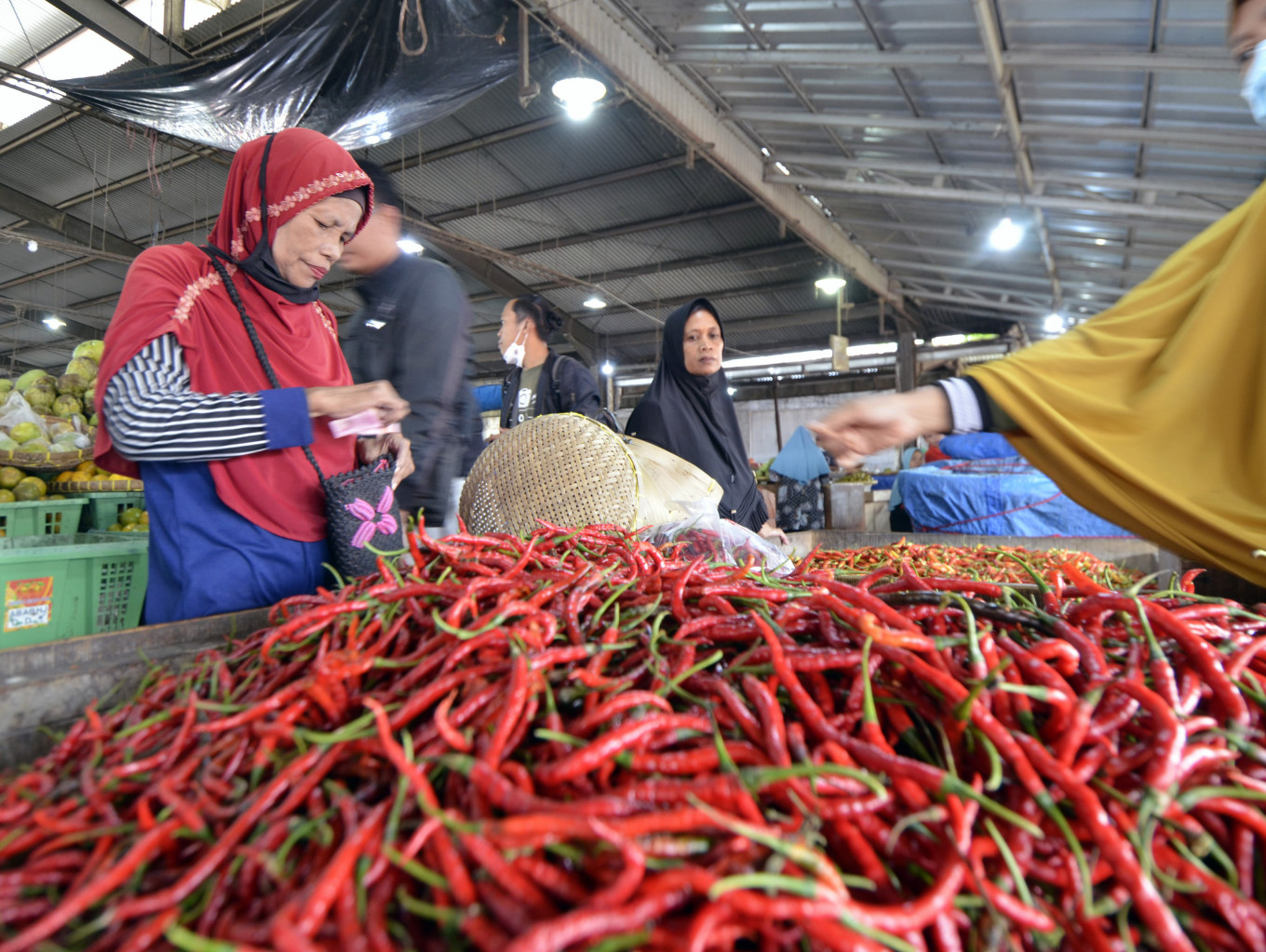Popular Reads
Top Results
Can't find what you're looking for?
View all search resultsPopular Reads
Top Results
Can't find what you're looking for?
View all search resultsInflation at seven-year high, exceeding BI’s revised outlook
Statistics Indonesia (BPS) reported on Monday that the consumer price index (CPI) increased by 4.94 percent year-on-year (yoy) in July as inflation accelerated significantly from 4.35 percent measured in the preceding month.
Change text size
Gift Premium Articles
to Anyone
I
nflation has surpassed already-revised estimates by Bank Indonesia (BI) and the government as consumer prices rise at their fastest pace since October 2015.
Statistics Indonesia (BPS) reported on Monday that the consumer price index (CPI) increased by 4.94 percent year-on-year (yoy) in July as inflation accelerated significantly from 4.35 percent measured in the preceding month.
On a month-to-month (mtm) basis, consumer prices rose 0.64 percent, higher than the 0.6 percent logged in June and 0.4 percent in May, but still below the 0.95 percent monthly increase seen in April.
At 4.94 percent, the annual inflation figure for July exceeds even a second upward revision by the central bank for this year, which expected inflation to reach a peak between 4.5 and 4.6 percent, as well as the government’s full-year projection of 3.5 to 4.5 percent.
Economists at state-owned Bank Mandiri and at Moody’s Analytics had expected July’s inflation to be 4.6 percent yoy and 4.8 percent yoy, respectively.
“This is the highest inflation since October 2015, when inflation was 6.25 percent yoy,” BPS head Margo Yuwono said during a press conference in Jakarta.
Read also: Inflation soars more than expected, driven by higher food prices
Spending on food, beverages and tobacco continues to be the main driver of consumer prices, as that category accounted for almost half of the 0.64 percent monthly inflation in July and as prices in that spending category were up 9.35 percent on the year.
Transportation remains the second-largest contributor to inflation and accounted for 0.14 percentage points of monthly inflation, up significantly from the 0.04 reported in June. Prices in the spending group increased 6.65 percent yoy due to skyrocketing global oil prices.
BPS data show that Indonesia recorded a US$2.14 billion deficit in the oil and gas trade in June as crude oil prices were up 62.67 percent yoy.
“The dominant contributor to inflation in the transportation group is air freight rates,” Margo continued.
The single commodity with the biggest effect on annual inflation in July was red chili peppers, followed by red onions and cayenne peppers.
Heavy rainfall was recorded in key cultivation regions for those crops, such as Cianjur and Garut in West Java and Brebes in Central Java.
“Food inflation is caused largely by domestic supply disruptions in the volatile food category due to [adverse] weather,” Margo added.
The volatile prices goods category continues to make up the lion’s share of inflation, accounting for a quarter of the overall 0.64 percent mtm increase as prices in that group increased 11.47 percent yoy, the fastest pace since January 2014.
The administered prices goods category remains the second-weightiest in terms of its inflationary effect, contributing 0.21 percentage points to the monthly CPI increase with an annual increase of 6.51 percent.
Core price inflation, meanwhile, remains below the headline figure with a rate of 2.86 percent yoy.
In recent months, BI Governor Perry Warjiyo and his deputies have repeatedly stated that decisions regarding the seven-day reverse repo rate (7DRRR) would be based upon core inflation rather than headline inflation.
In response to the latest data, the central bank has again upped its full-year inflation projection, after previously revising it to 4.2 percent.
“With the development of global commodity prices continuing to rise, we believe inflation […] at the end of this year could be higher than 4.2 percent; it could reach 4.5 or 4.6 percent, that is CPI inflation,” Perry said after July’s monthly monetary policy meeting.
Read also: Bank Indonesia remains dovish despite rising inflation
Economists from Bank Mandiri said demand-pull inflation, where increased demand drives prices up, would continue amid relaxed domestic pandemic restrictions.
At the same time, protectionist trade policies in major commodity-exporting countries would see food ingredients increase in price, creating a cost-push inflation effect.
"Producer price index [PPI] inflation and wholesale price index [WPI] inflation, which have already been above CPI inflation, could also create a risk of supply-side inflation passing through to demand-side inflation," reads a note from the Mandiri economists.
Institute for Development of Economics and Finance (INDEF) economist Abdul Manap blamed the higher-than-expected inflation on global uncertainty as the war between Russia and Ukraine had yet to end.
The increase in all three inflation components – volatile prices, administered prices and core prices – had hurt consumers’ purchasing power before the latter had fully recovered from the pandemic impact, and there was a chance of more restrictions as COVID-19 cases were rising.
He warned that higher inflation could reduce the 2022 GDP figure as consumers would reduce spending.
"For example, if there are more restrictions, so that [economic activity] is curbed when prices are rising, the situation will be even more dangerous," Abdul told The Jakarta Post on Monday.










